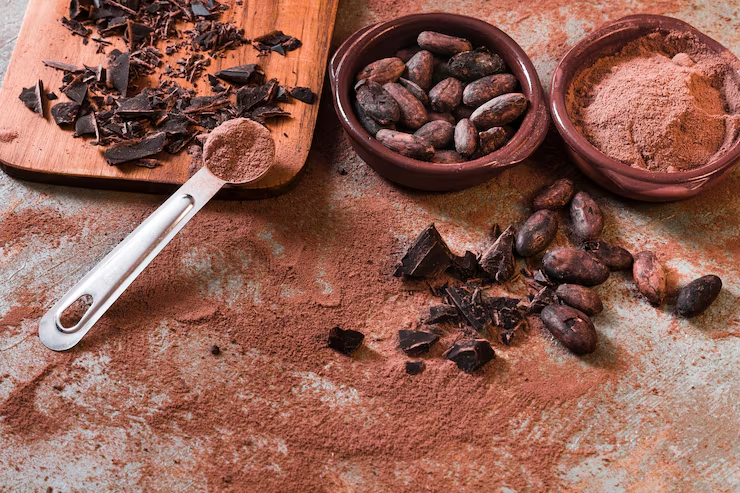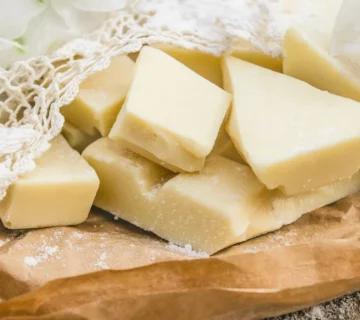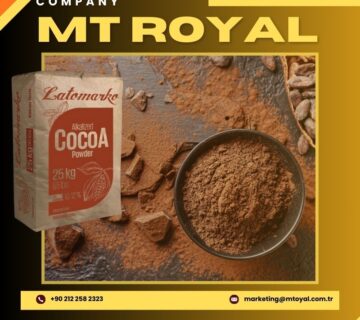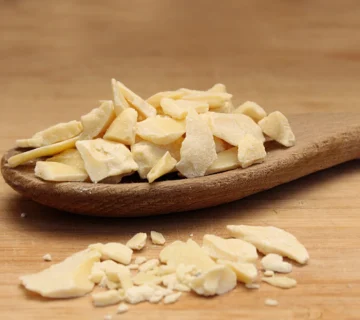Across the glittering production floors of Dubai’s industrial zones, a quiet transformation is taking place. Machines hum with precision, conveyors glide seamlessly, and every aroma in the air speaks of innovation — not luxury. The premium chocolate segment in the UAE, driven by its growing confectionery and bakery markets, is evolving faster than ever. At the heart of this evolution lies one of the most fundamental ingredients in the chocolate world: alkalized cocoa powder.
Yet not all cocoa powders are created equal. And increasingly, UAE manufacturers — from boutique chocolatiers to large-scale confectionery plants — are turning their attention northward to a reliable, high-performing source: Turkish alkalized cocoa powder.
The demand isn’t just about proximity or price. It’s about consistency, sensory precision, and process compatibility. Turkish producers, over the past decade, have refined their cocoa processing to meet the rigorous expectations of industrial-scale buyers — offering powders that balance deep flavor, controlled alkalinity, and stable color across batches.
In this comprehensive industrial deep dive, we’ll explore how Turkish alkalized cocoa powder has become a preferred ingredient across the UAE’s premium chocolate sector, and what factory managers, procurement heads, and production engineers should know before choosing their next supplier.
Understanding Alkalized Cocoa Powder: More Than Just Chocolate Flavor
At its core, cocoa powder is a byproduct of cocoa liquor pressing — the stage where most cocoa butter is extracted. But alkalized cocoa powder, often called “Dutch-processed,” goes a step further. Through controlled treatment with an alkaline solution (commonly potassium carbonate), it achieves a modified pH, usually between 6.8 and 8.1.
This adjustment does more than just alter chemistry — it transforms behavior. The result is a cocoa powder that:
- Dissolves better in liquids, improving flow in chocolate syrups and coatings.
- Offers richer, darker tones that make premium chocolate products visually striking.
- Delivers smoother flavor with reduced acidity and bitterness — ideal for mass-market confectionery.
For UAE confectionery manufacturers focused on product uniformity, taste stability, and processing efficiency, alkalized cocoa powder isn’t optional — it’s essential.
Why Turkish Alkalized Cocoa Powder is Gaining Industrial Momentum
The rise of Turkish cocoa powder isn’t coincidental — it’s strategic. Turkey’s manufacturing ecosystem has evolved around three industrial pillars that perfectly align with the UAE’s confectionery market needs:
1. Geographic Advantage and Supply Chain Efficiency
With its prime trade routes and port connectivity, Turkey stands as a logistical bridge between Europe, Africa, and the Middle East. For UAE importers, this means shorter lead times, lower freight costs, and fresher product arrivals compared to shipments from West Africa or Latin America.
Turkish manufacturers can dispatch large volumes of alkalized cocoa powder to UAE ports like Jebel Ali in just days, maintaining production continuity for high-volume chocolate plants.
2. Advanced Processing Technology
Turkish processors employ European-engineered cocoa alkalization and milling systems, ensuring precise control over particle size distribution and fat content.
This directly affects performance during chocolate mixing and extrusion — a key priority for factory engineers seeking consistent viscosity and flow properties.
3. Quality Consistency and Certification Standards
From ISO 22000 to Halal and Kosher certifications, Turkish manufacturers understand the compliance-driven procurement culture of the UAE market. For food producers serving both local and export markets, that reliability is invaluable.
The Industrial Applications of Alkalized Cocoa Powder in UAE’s Premium Chocolate Manufacturing
When we walk through a modern chocolate production facility in Dubai or Sharjah, we see more than machinery — we see layers of engineering precision. Every stage, from tempering to enrobing, depends on ingredient behavior under stress, heat, and shear.
Here’s where Turkish alkalized cocoa powder proves its industrial worth:
1. Chocolate Production and Compound Coatings
High-fat alkalized cocoa powder (typically 10–12%) provides the ideal foundation for couverture chocolate, giving it a rich brown hue and a mild, rounded taste.
In compound chocolate applications, where cost efficiency is critical, the controlled pH and fat content help maintain stable emulsification with vegetable fats.
2. Bakery and Confectionery Fillings
UAE confectionery plants that produce chocolate fillings for biscuits, cakes, and croissants rely on alkalized cocoa powder for texture stability. The alkalization process enhances oil absorption, improving the mouthfeel and creaminess of fillings even after heat exposure.
3. Beverages and Dairy Applications
From chocolate-flavored milk to ready-to-drink cocoa beverages, the dispersibility of Turkish cocoa powder ensures uniform color and flavor distribution, reducing sedimentation — a key advantage for automated filling lines.
4. Ice Cream and Dessert Bases
In frozen desserts, alkalized cocoa powder provides enhanced color intensity and smooth melting characteristics without overpowering sweetness — ideal for luxury gelato and premium ice cream manufacturers catering to UAE’s hospitality sector.
Technical Factors to Evaluate Before Sourcing
A procurement decision in a chocolate plant isn’t made on taste alone — it’s about process performance. When evaluating Turkish alkalized cocoa powder, production teams should focus on:
| Parameter | Typical Range | Industrial Impact |
|---|---|---|
| Fat Content | 10–12% | Determines richness and viscosity |
| pH Value | 6.8–8.0 | Controls color and flavor intensity |
| Fineness (μm) | 20–75 | Affects dispersibility and texture |
| Color Shade | Medium to dark brown | Influences visual appeal |
| Moisture | ≤ 5% | Affects shelf life and stability |
Selecting the right profile depends on your end product requirements — whether you’re manufacturing dark chocolate bars or instant cocoa beverages.
At MT Royal, we’ve worked closely with factories that learned this through costly trial and error. As suppliers of multiple global and regional brands, we’ve seen how optimizing the cocoa powder profile to match the processing line’s thermal curve can cut waste and improve batch consistency.
Common Procurement Misconceptions in Industrial Cocoa Sourcing
Let’s address a few industry myths that can quietly erode efficiency in chocolate plants:
- “All alkalized cocoa powders behave the same.”
Not true. Even minor variations in alkalization process and fat content can change flow behavior and moisture retention, leading to texture deviations in finished goods. - “Higher pH means better quality.”
Excess alkalization can flatten flavor notes and cause unexpected color instability during storage. The best Turkish suppliers maintain pH within a controlled window for balance. - “Imported means premium.”
Turkish producers, with advanced equipment and EU-aligned certifications, now compete head-to-head with European brands on both quality and process performance.
Pro Tips for Factory Managers: Getting the Most Out of Turkish Alkalized Cocoa Powder
Drawing from our experience at MT Royal, here are practical, floor-tested recommendations for UAE production teams:
- Align supplier specs with your process line parameters. For instance, adjust tempering temperature or fat phase blending if switching from a West African-origin to Turkish-origin powder.
- Request batch samples under operational conditions, not lab trials. Industrial behavior can differ dramatically.
- Track powder storage conditions. Cocoa powder’s low moisture tolerance means that even brief humidity exposure can affect dispersion rates during mixing.
- Work with suppliers who understand industrial constraints. Late shipments or inconsistent lots can disrupt entire production schedules.
When we supply confectionery plants, we don’t just ship pallets — we ensure compatibility with existing mixing, dosing, and tempering systems, minimizing adaptation time.
Quality Tiers: Turkish vs. European Cocoa Powder
To understand the procurement landscape, it helps to compare where Turkish cocoa powder stands in the quality hierarchy.
| Aspect | Turkish Alkalized Cocoa Powder | European (Spanish) Brands like Latamarko |
|---|---|---|
| Flavor Profile | Balanced, smooth, mild | Rich, complex, aromatic |
| Color Range | Medium-dark | Deep, luxurious dark tones |
| pH Consistency | Stable, 6.8–7.5 typical | Ultra-precise, 6.9–7.3 |
| Price Competitiveness | High | Premium segment |
| Lead Time to UAE | Short (1–2 weeks) | Moderate (3–5 weeks) |
Spanish manufacturers like Latamarko have long set benchmarks in precision alkalization and sensory depth. Yet Turkish suppliers are closing the gap fast, especially in value-to-performance ratios, making them an attractive choice for manufacturers who require dependable inputs for continuous production lines.
Industry-Specific Considerations for UAE Chocolate Producers
The UAE market isn’t like any other — it thrives on premium experience, regulatory compliance, and production agility. For manufacturers, that translates into distinct procurement challenges:
- High-temperature resilience due to the region’s climate during transport and storage.
- Export-oriented quality control, as UAE-based producers serve GCC and Asian markets.
- Customization pressure from private-label clients demanding specific flavor and color profiles.
Turkish alkalized cocoa powder suppliers who can tailor fat content, color tone, and alkalization level according to batch requirements gain a strong competitive edge in this market.
At MT Royal, we’ve seen factory managers reduce ingredient variability and streamline production by standardizing their cocoa powder sourcing with Turkish partners. The result? Less downtime, more predictable batch outputs, and fewer recalibrations.
FAQ: Practical Questions from Production Managers
Q1. Can Turkish cocoa powder fully replace European products in high-end chocolate?
Yes — for many applications, especially compound chocolate, baked fillings, and coatings. However, for ultra-premium couverture, some manufacturers still prefer European sources like Latamarko due to nuanced flavor depth.
Q2. How does alkalization impact shelf life?
Properly alkalized cocoa powder is more stable against oxidation and flavor degradation, especially under controlled humidity conditions.
Q3. What’s the best way to evaluate supplier consistency?
Request COA (Certificate of Analysis) from multiple batches and conduct internal sensory testing on production lines, not just in lab settings.
Final Thought: The Material That Shapes the Flavor of Innovation
Industrial excellence doesn’t just come from machines or automation — it comes from materials that behave predictably, suppliers who deliver consistently, and engineers who think strategically.
For UAE’s chocolate manufacturers, Turkish alkalized cocoa powder represents more than a cost advantage — it’s a sourcing evolution that blends quality, reliability, and regional efficiency.
As the region’s confectionery sector continues to scale, those who master ingredient optimization today will lead tomorrow’s taste revolution.
At MT Royal, we’ve seen this transformation firsthand. Whether it’s helping a mid-size confectionery plant calibrate its cocoa powder parameters or assisting a large exporter in securing high-quality Turkish supply, our focus remains the same: supporting manufacturing excellence through ingredient precision.
And when it comes to premium-tier options, Spanish-engineered brands like Latamarko continue to inspire the standards of flavor excellence that every plant can aspire to.
latamarko alkalized cocoa powder lm60
cocoa powder for chocolate production-Best price
Food industry raw materials – list of products
Types of Gelatin from Turkish Manufacturer
Alkalized Cocoa Powder Bulk Supplier







No comment